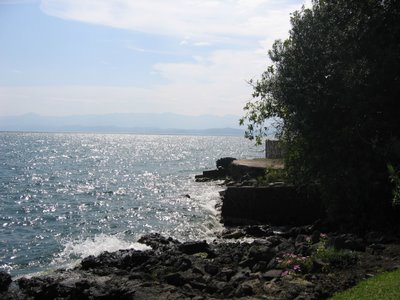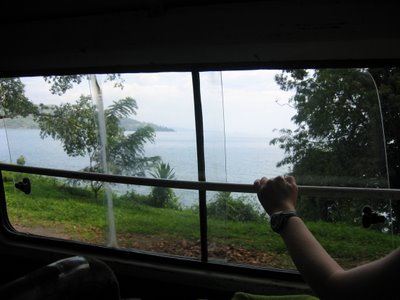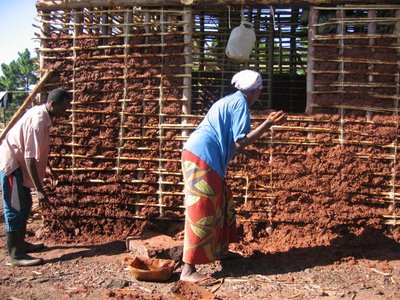After we crossed the border into Congo, we spent about three hours just roaming around looking for a hotel and seeing the sights. The hotels really showed us the nicer parts of Goma; as I said, it is right on the coast of Lake Kivu, which looks more like an ocean than a lake (actually, the best part about it is that there are no crocodiles or hippos because of the volcanic ash from the eruption – safe for swimming). The water and the nice weather seemed to make it a perfect vacation spot, and it was for a lot of people (I saw a lot of muzungus vacationing at the hotels). But, only a few miles from these pristine coastlines was horrible poverty, people living literally on top of volcanic rock. What makes this so difficult, for example, is that you can’t farm on volcanic rock – you can’t get into the ground. It also means that latrines, which are usually created by digging a hole in the ground, have to be built on a small cube of volcanic rock. In these circumstances, it almost seems impossible to live in any condition but poverty. Jotham explained to us that this extreme poverty in such proximity to the beautiful coastal area is one of the biggest problems in Goma. People can easily forget the lives of many poor Congolese Gomans while relaxing by the lake.
After we finally found our hotel (and after Jotham tried to convince the hotel receptionist that Hillary was our sister despite the obvious race and age differences – a good effort to save money by getting only one room), we went to see the volcano that had erupted. Jotham told us that when the volcano erupted, it was “sending lavs” (lava) all the way down in to the city, and created these huge fields of volcanic rock. Luckily the lava was moving slowly enough for people to flee, so very few if any died from the immediate effects of the lava. We finally decided that maybe it was time to go to the wedding and started on our way. But, when we stopped for gas, the car wouldn’t start. Jotham started laughing and said “it is always an adventure in Congo.” Because this happened once before in Rwanda, I got out of the car and helped a few guys push the car backwards. The trick is to get it rolling, either forwards or backwards, and then the driver slams on the brakes and gives it a quick start. I’ve seen it work.
Unfortunately, Jotham had never seen it before, or it just wasn’t properly communicated to him that we were trying to do that. So, two guys from the gas station and I are pushing the car around the lot, and Jotham is just going in circles around the gas pumps like we are playing a game, until he finally pulls out into the middle of the road and stops the car. I looked at the guy next to me and asked what Jotham was doing; the guy said he had no clue. That plan failed; luckily, another guy (who I’m pretty sure had been drinking) came over with a better plan and told Jotham to pop the hood. It’s okay; I’m a driver he said.
I am not too familiar with cars, so I wasn’t too sure what was going on at first. The guy unplugged a tube in the hood and put his mouth on it, and started sucking on it, searching for liquid. I asked another guy if it was water in there, and he said no, it was gas. The guy was sucking gas up a tube into his mouth, and then spitting it out onto the engine (then I was certain he had been drinking). And of course, he stops paying attention for a second while sucking gasoline into his mouth, and voila, he sucks up too much and swallows a bunch. He starts coughing and howling and dry heaving, and without a moment’s hesitation, the guy next to him takes the tube and starts sucking up gasoline into his mouth. This guy doesn’t eat the gasoline, and eventually replaces a small filter. The car starts, and we were on our way to the wedding. Always an adventure in the Congo.
By this point it was about 6:00pm, and the wedding had already passed; we were only going to the reception. Jotham explained to us that in the Congo and other parts of Africa, weddings are open to the whole town rather than those people who are invited, which made me feel a little better about intruding on this wedding. Jotham was busy taking hundreds of pictures outside (like the bridal party car), so Hillary and I walked in and took a seat in the middle rows of the hall. There was really no hiding us because we were the only muzungus there, but we thought it would be respectful to sit in the middle rows. Maybe 5 minutes later, a few ushers asked us to move our seats; they brought us to the front row of the hall, next to the parents of the bride and groom.
The ceremony itself was very interesting. When the bride and groom arrived, they were preceded by a line of young girls dancing. The 8 girls danced down the aisle (traditional Congolese dance I think), and the MC announced Mupenzi and Alina, the happily married couple. When the couple finally reached the front, they settled onto a couch together. The MC got the crowd riled up by saying things like “Hey young men – see this girl here, Alina? Well starting today she is not available anymore.” Sort of different to me, but they loved it. Then the MC called for the traditional part of the ceremony; the sharing of a Fanta Orange (orange soda). A woman brought out one orange soda and two glasses. The maid of honor popped open the Fanta Orange, and Alina poured a glass as the MC narrated. She brought the glass up to Mupenzi’s mouth and he took a sip from the glass. He poured the second glass, and did the same for her, and everyone went crazy for it.
Finally, they brought out the food for the reception, which was brochettes, some vegetables, fried bananas, some meat, and a whole unidentifiable bird (it was still whole with its head on and everything, like it was about to run away). As I am looking at the food, I hear the MC say something (in French) about muzungus and praying. I thought he had invited us, the muzungus, to pray, but I couldn’t be sure. I looked around to see if I had translated correctly, and everyone in the hall is staring at me and Hillary. I look at Hillary, and then at the people, and then at the MC; they are waiting for us to come up and pray for the food before we eat. So, I walk up slowly, trying but failing to look nice in my dirty jeans, muddy sneakers, unshaven face and plain t-shirt. The guy hands me the mic and everyone is staring at me. Keep in mind, I don’t know a single person in the whole building (which was actually better because I realized I would never see these people ever again). So, I say in French that I am going to say the prayer in English because it is easier for me; but Hillary, hearing me speaking French, thought that I was saying the prayer in French, and ran back to her seat. Now I am up there by myself, trying my hardest to bring myself back to the days of high school, hearing a prayer before class everyday. I cleared my throat, blessed myself, a delivered a prayer blessing our ability to be together as a community for this wedding, and blessing Mupenzi and Alina as they start their life together. They loved it, thanks to that Jesuit education. Always an adventure in Congo.
The next day, we went to church at Jotham’s parish. As this was in the poorer part of Goma, we were walking on lava rocks all day. Jotham is actually the bishop for this church in Rwanda, so I think it was a great honor for him to come back. Although there is no electricity in this town, the church had a generator, which was used to power a few electric guitars and four microphones. The walls were draped in purple cloths, and the benches were made makeshift, locally done, made of wood. On top of the benches were noise makers, which were steel boxes filled with beads or corn. They were made out of USAID Vegetable Oil cans, which was funny for me to see, as those cans (and so the noisemakers) all say “Brought to you by the American People.” Noisemakers brought to the Congo by the American people. The church didn’t have any stained glass windows, statues or monuments. There were no cushioned kneeling pads, or painted ceilings. No mahogany benches. It was refreshing to see people celebrating their beliefs in a normal environment, without having spent hundreds of thousands of dollars on superfluous decorations.
Jotham was the guest at church, so he gave the sermon. When he started, he introduced us, and asked us to come up and say something about ourselves. You think that after yesterday, he would give us a warning that we would be speaking at church, but he didn’t. No big deal though, just our names and where we were from. But then, after maybe three minutes, he asked us to come up and speak again about how the President of the United States uses the bible in his governance of the country. My first thought was – well, inappropriately, but I knew that wasn’t the answer he was looking for. Luckily Hillary knew, and explained that he swears into office with his hand on a bible, and says that he promises to serve God and his country (she later told me that she wasn’t sure if that is what the president says or if that was what the girl scouts say). After hearing from four choirs, which was great – the children’s choir, the young person’s choir, the older person’s choir, and the university students’ choir – mass ended and we headed back into town. Always an adventure in Congo.
The end of our trip was a tour of a previous ARC site in Goma. The genocide was brought to a near end when the Rwandese Patriotic Front (RPF), a largely Tutsi military faction, invaded Kigali and seized power from the extremist Hutus behind the genocide. Many of these Hutus fled to Eastern DRC (then Zaire) seeking shelter and a place to plan their counterattack. However, Hutu families from Rwanda who were not involved in the genocide also fled to Eastern DRC, fearing retaliation from the Tutsi population and RPF. The combination of the Hutu extremists and the Hutu families was about 1,000,000 people; the facilities were insufficient, and the water was infected, which eventually led to a cholera outbreak that killed tens of thousands. We saw where all the facilities were set up and how everything worked when ARC was there.
That night, we took a mini-bus back to Rwanda. On the way, we were driving along these windy roads on mountain sides in the dark, and we saw a man lying in the middle of the road, on the opposite side. We stopped, and our driver stepped out to see if he was dead. The guy was unresponsive, and nobody knew what to do. For a little while, we thought it might be a set up for a robbery or something. But all of a sudden, the guy gets up, looks around, and runs away. Probably drunk. Always an adventure in Congo, even on the way back.
Work here is going well; I have applied for a grant to build a soccer field for the kids down here, and I think we will get it. If that comes through, construction will start next week, and hopefully be done by mid-November. We just submitted our first PEPFAR report, which is a relief because we won’t have to do another until January.
I’m in Nyabiheke all this week learning to build improved cookstoves out of clay, straw, and mud. I’ll run a training for trainers in the camp for the greater population to use them – maybe when I get back, I’ll run a training for everyone at home. I’m telling you, these stoves are pretty useful. Thanks to everyone for writing and reading, I really appreciate it.








